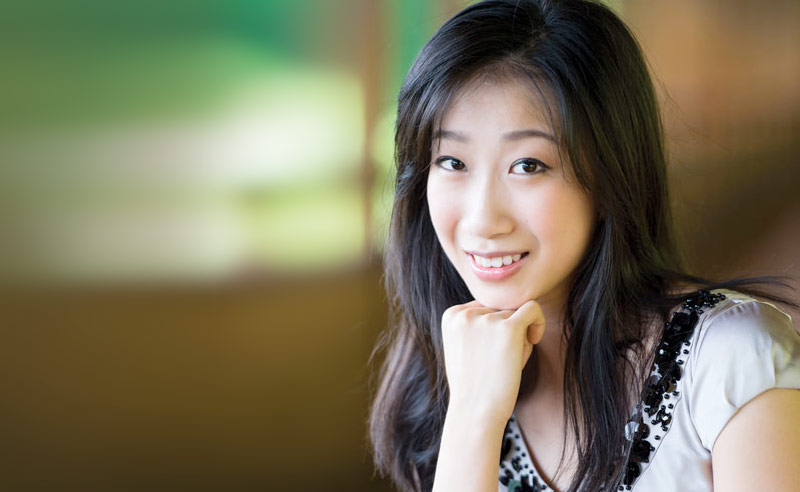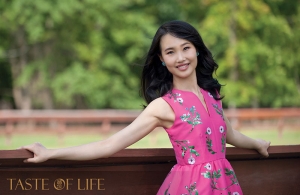Dancers Diana Teng and Kaidi Wu met in New York 10 years ago. They’ve toured the world together, performed together, and spent hours together on buses, airplanes, and hotels for months on end. But here, for the first time, Diana sits down to learn more about the background of her friend Kaidi, known more for starring as the Goddess of the Moon than as a young girl jumping off rooftops in a rural Chinese village.
Childhood
DT: Let’s talk about your beginnings. You are a native of China, correct? When did you leave the country?
KW: Yes, I was born in Hebei province and moved to Toronto, Canada, when I was 10. It was five days before my birthday, and I remember it was the most awkward birthday I’ve ever had. I wasn’t close at all with my parents—we had been separated for seven years. They were singing happy birthday and I just sat there by myself in front of the cake, feeling no emotions whatsoever.
DT: How was your birthday different from your birthdays in China?
KW: Well, I usually celebrated with a bunch of people, which included my cousins—three girls, one boy—aunt, uncle and grandparents, so it was really festive. In Canada it was just me. And my parents, who felt like strangers.
DT: What’s the story behind that?
KW: My parents had to leave me when I was a few years old. They were fleeing persecution at the hands of the Chinese Communist Party. Both my parents practiced Falun Dafa (a spiritual discipline that emphasizes the moral principles of truthfulness, compassion and tolerance). When the persecution of Dafa erupted in 1999, they saw people around them arrested from their homes or disappearing in labor camps. Some people they knew were even tortured and killed because they wouldn't give up their faith.
My parents decided to escape to Canada in search of religious freedom and a better life. They didn't want me to share the initial hardships of starting a new life in a very different country, so they decided to get a start ahead and settle down first. I moved in with my other family members who lived in the Chinese countryside, and they actually raised me throughout my early childhood. I was so young when everything happened; I hardly remember anything.
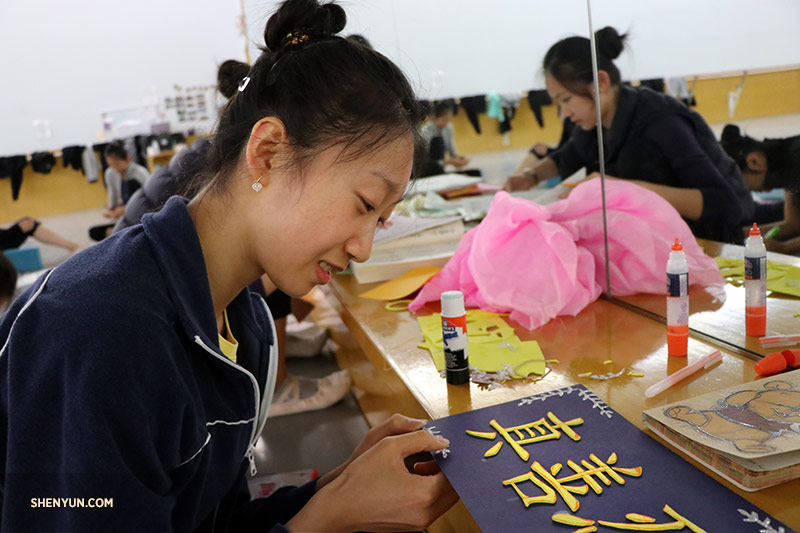
DT: I’m sorry to hear that. It’s fortunate that you are now reunited with your parents. Were you very close to your other family members then?
KW: Yeah, I was especially close to my cousins, who were about the same age as I was. We enjoyed many of our childhood memories together, along with my aunt, uncle, and grandparents. In the countryside, we lived in a communal-like property next door to each other. My cousins and I often visited each other by climbing the roofs.
DT: Roof Climbing! Sounds like a Peter Pan adventure. Was that like a children’s activity or was that really an entrance?
KW: That was actually an entrance-exit. In those houses, there was a ladder that went to the roof, so you could climb up and walk across a small pathway that was fixed on the rooftops. It was easy access to sneaking into my cousins’ rooms. Apart from that, we used the roof to dry corn crops during the fall season.
DT: That sounds really fun. So what was your life like then? Was it shocking to you when you moved to a new environment?
KW: Well, I was so young when I moved in with my aunt and uncle that the countryside life was all I knew before going to Canada. In China, we attended school from 7:30am to 7:30pm. The electricity would often go out so we would light candles. I remember once we were doing homework and the person behind me accidentally knocked her candle over. The fire caught onto my hood and hair… But don’t worry! It was just a few strands; I wasn’t half-bald after that.
DT: That sounds like a scene I would only see in movies! Okay, now I feel free to ask you about the “typical” countryside life. I’m guessing your family raised farm animals as well?
KW: (Sheepish smile) We had a huge pen full of rabbits—I don’t know why—cats, dogs, as well as a pigpen with a single pig in it.
DT: Nice! Did you help take care of the animals?
KW: Not from what I remember. What I do remember is being scared of the dog. I think I saw it kill a cat, so I developed this dog-phobia that’s lasted ‘til today. But the rabbits, they were adorable, even though their pen was so filthy! But yeah, apart from dogs, I’m pretty good with animals.
DT: I also hear from your friends that you are extremely good with bugs.
KW: Uh-oh, I didn’t think many people would know that! Yes, my grandfather was a Chinese doctor, so he used specific bugs for medicinal purposes. He would often take me out on bug-catching sessions, educating me about the ones that were important to his work. It became child’s play for me; my cousins and I would often bug-catch together. That’s why I’m not scared of bugs, and so my friends here at Shen Yun often find me to get rid of bugs.
DT: So if there were a praying mantis on this table, you would definitely escort it out right?
KW: I have actually caught one. But they’re kind of feisty. That one gave me a paper cut. Okay this sounds brutal, but we would tie strings around the body of dragonflies and let it “fly” us around. Later at night we would free them in mosquito-infested areas because that’s their prey. It was a win-win situation. I never try to kill bugs!
DT: There’s no way I would have had the skill or guts to do that, though in the U.S. suburbs, we did roll each other around in recycle bins… But anyways, what other crazy things did you do out there?
KW: Okay, this is probably as grimy as it gets. The drainage systems were horrible, so when it rained heavily, it flooded. A lot. The water reached up to our knees, and you know how kids love mucky, filthy water? My cousins and I would rush out right away to jump and splash around. It was just pure fun.
DT: Living in rural China, there wasn’t any proper plumbing, either, right?
KW: Ohh… yeah. We had to walk to the outhouse, which was literally just a huge dug-out hole. It was connected to the pigpen, so I’m guessing the pig had lots of “food.” You can imagine how bad it smelled. And, as Chinese farmers all know, accidentally falling into those ditches can mean death. (grimaces)
DT: Living such a carefree life filled with such activities, how did you start taking up on dance?
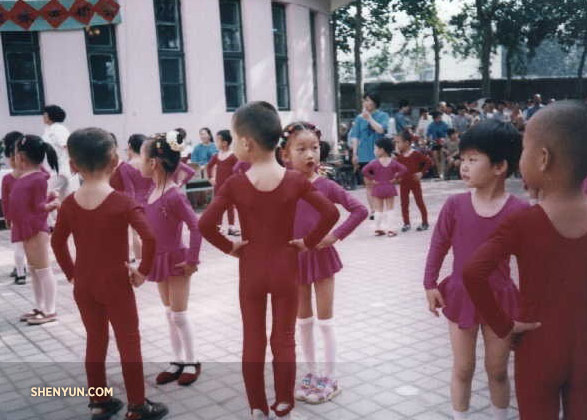
KW: I was 8 when this happened. Once when I was showering, I nearly slipped and fell in the bathtub. My aunt scolded me and said, “You have such bad balance! You should be like a dancer, then you’d be poised and have good balance!” I was like “Okay fine, I’ll go dance!” I guess that incident led me to this path. The first time I stepped onto the dance floor, I knew it was going to be my career. But two years later, my parents called for me and I left to go to Canada.
DT: How did you feel about moving to a different country and changing your life?
KW: I didn’t want to go to a foreign place, but my grandparents thought that I could attend a good university (namely Harvard), so they encouraged me to take on a new life. Being a child, I didn’t have much say in the decision, but I guess it was a good thing because otherwise I wouldn’t have been able to be here in Shen Yun.
Beginnings at Shen Yun

DT: So how did this move link you to your next destination here at Shen Yun?
KW: My parents took me to New York to watch the New Tang Dynasty Television Holiday Wonders performance during Christmas one year, and when I saw the girls dancing in the beautiful oriental costumes, I immediately knew I wanted to do that, too. A couple years later, a friend of my mom’s suggested that I try out for Shen Yun. I was initially very nervous about being accepted because I had stopped dancing for a while and my legs were stiff. But on October 21, 2008, I was officially accepted and was on my way to New York!
DT: So it’s been, wow, 10 years since you started training with the company. I’m sure you’ve progressed and changed over the decade. What do you remember about your first few years being a fledgling?
KW: Within the first few months, my teachers and classmates coined me as the (Mexican) “jumping bean.” My jumping ability was exceptionally good, but my landing was super bad, so I looked like an uncontrollable jumping bean. I also got nervous very easily. I remember we were practicing quick-changing one time. I ran into the changing room so flustered, failing to rip off my belt, hat, costume and chopsticks. Three people ended up trying to help me while I was frantically hopping around saying, “There’s no time, there’s no time!” I ended up being the last one out of the changing room. I was also really nervous about some of my fan shen techniques, so nervous that I couldn’t get ahold of my direction and well, it was just really off-looking in the beginning.
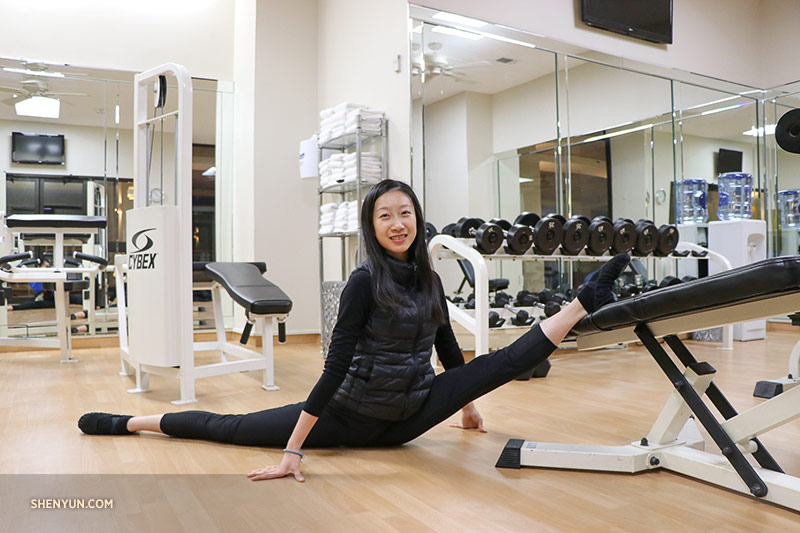
DT: That doesn’t sound like the Kaidi Wu I know! You’re now dancing solos and often up-front leading the lines; how did you transform into who you are today?
KW: I realized that I lacked confidence. Through hard work, I saw that practicing movements and techniques until you are really comfortable with them will give you confidence. Being experienced helped too. The more I encountered, the more I knew how to deal with things. With a calm and steady mind, you’re always able to find the right solution.
DT: Right. Being passive about our problems really isn’t the way to go. What were some instances where you had to bring your moral awareness into play?
KW: I remember one time I was assigned to play the role of grandma for a mini-drama dance about the monk Ji Gong. I really, really disliked that role. I was so upset over it I lost my temper and cried about it. That revealed some of my selfish habits and, over time, I learned the importance of selflessness because on stage, everyone is the same despite the roles and positions we might play.
As fellow dancer Yuxuan Liu once told me, “What effort you put into the show directly affects the outcome for the entire company, not Kaidi Wu as an individual.” In the end, we are giving the audience one final performance. And of course, the veteran performers, like Miranda Zhou-Galati and Rachael Bastick, gave me much comfort and advice. My success owes much to them. Every moment we spend together is as if we’re sisters.
One of my first breakout roles was playing the part of Lin Chong’s wife, which was emotionally demanding because in that story, she committed suicide after she was assaulted by another man. The choreographers were initially dissatisfied with my performance. It wasn’t until later on that I came to more deeply understand her emotions rather than just completing the choreography. It was also the first role where it needed to work very closely with another dancer. It became a maturation process. The most important thing was that I needed to grow up as a person, to let go of myself and to feel others.
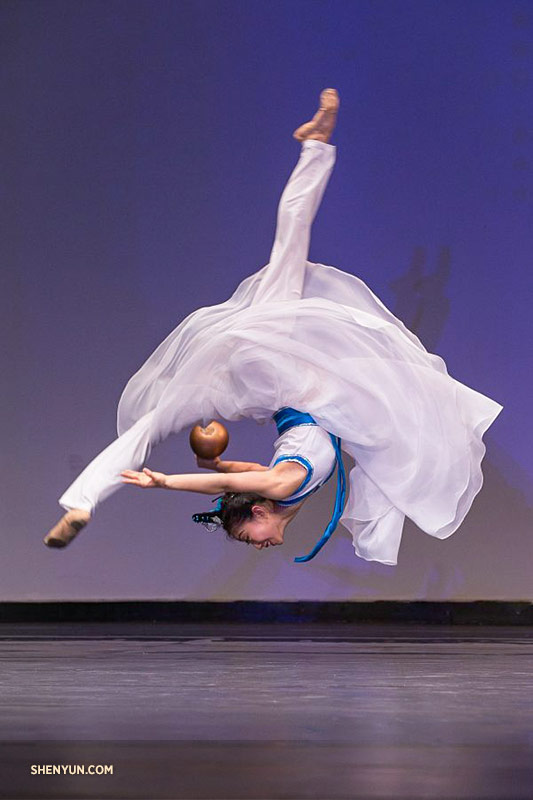
DT: And now, you’re a veteran performer who’s toured so many seasons already. What’s the hardest thing about your career?
KW: I guess it’s the everyday routine, the schedule. It gets repetitive sometimes, especially when there are more show-days to conquer. But once I think about our company’s mission—to revive traditional Chinese culture—and how big it is, my problems seem much smaller. The audience motivates me as well. Every time I experience their genuine smiles and long applause, I know that it’s worth it.
Another challenge we face is keeping slender. It’s our duty as dancers to keep in shape, and that gets a bit hard during tour when the schedules are packed, meaning fewer training sessions; not to mention there’s really good food.
DT: (laughs) Yes, we know all about that. What are some of the things you do to stay slim and fit?
KW: Well, I kick. A lot. In Shen Yun, we have a basic standard of doing 300 kicks daily (back, front, and side). It has become a habit of mine to kick at least twice a day (meaning 600+). A pre-show kicking session is a great way to warm-up and I find that it comforts me to have that done. One day I felt so gross with myself I kicked 1,500, which took about forty-five intense minutes... I don’t think I’ll ever do that again. (laughs) Did I add that I’m doing this with a thermal sweat suit on?
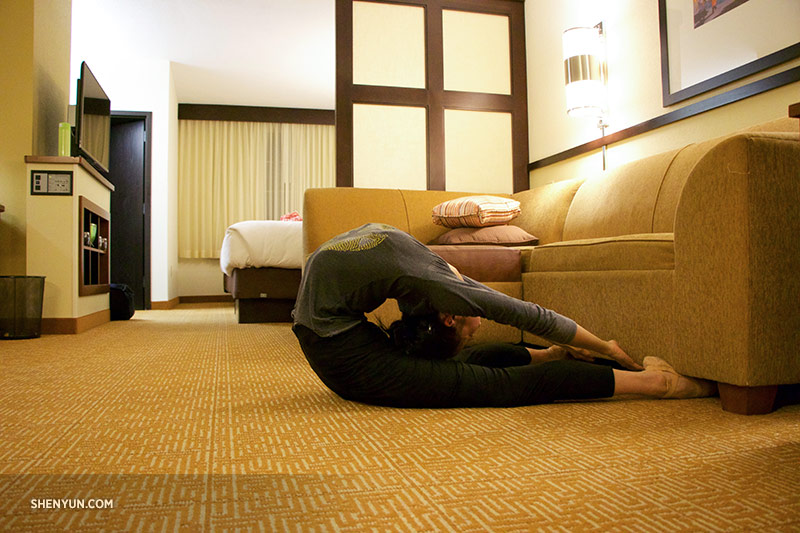
Aside from intense training, eating less is also important. I skip starch and eat more meat and veggies. I snack on nuts (I love nuts!) for additional energy and I drink sparkling water instead of soda. Did I say that I like nuts already? I enjoy them so much my friends called me “squirrel” for a while.
DT: Haha! No worries, everyone has their strange obsessions, mine would be Hot Cheetos. Do you have any dance props you really like?
KW: I like dancing with scarves. I used scarves twice for my dance competition routines. They’re light and flowy, and when I dance with them, I feel just as graceful. I’m also quite girly, which also might be why I enjoy that.
DT: Okay then, let’s do some girl talk. What is something that you have an overstock of? Because you know, we all tend to buy too much of the stuff we love.

KW: Hehe, well I own many pairs of sneakers, at least seven I think. Every time I see New Balance shoes that are pastel colored, I get excited. Most of the time I end up getting them. I also have a lot of clothes—numerous Lululemon jackets and black workout pants.
DT: What’s your typical style like? When you are not in dance attire, that is.
KW: Definitely girly and feminine. I like flowy skirts and dresses with flowery patterns. I own many light-colored scarves that are almost identical in style, too. I’m also attracted to cute things—I have so many Snoopy shirts and accessories!
DT: What about your off-hours—what do you do to unwind and relax?
KW: Well, I almost always have classical music on in my room. It gives the room a nice mood. And I like to just chill, chat with friends, the usual you know?
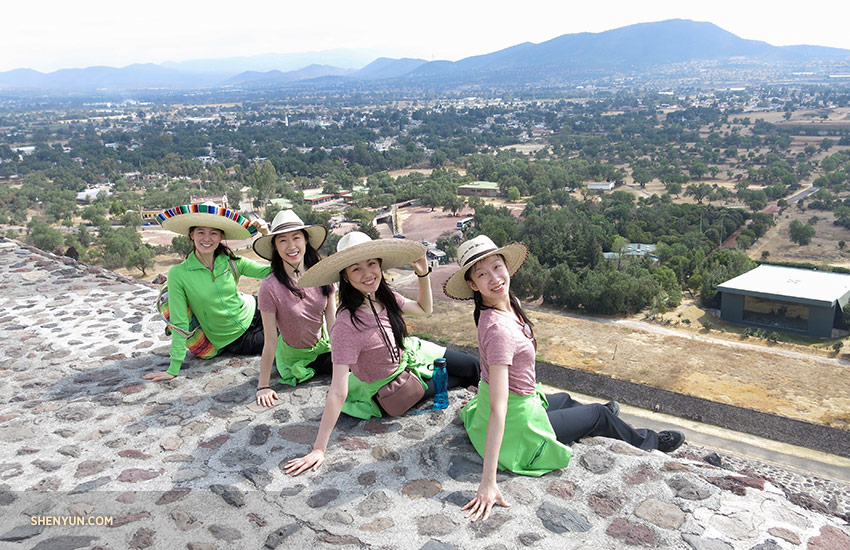
DT: Yes, surround yourself with what you love. To wrap up this interview, any inspiring words you’d like to share? Maybe something you often use to remind yourself to keep striving forward.
KW: Well, when I encounter conflicts with people, I usually tell myself “It’s okay. Understand others and try to look at things from their perspective, because we all have our own hardships.” And when I feel frustrated, I remember some inspiring words my teachers and classmates often tell me. “Just do it! Since this is your profession, you should stick to it and make the most of it. No one is perfect and if you do your best, you will get what is meant to be yours. Hard work is never wasted!”
Lastly, I hope to tell the world that hardships are always out there. But looking at things with an open mind can shape the environment we’re in for the better!
More about Kaidi on Elite magazine: Ethereal Grace|Shen Yun Principal Dancer Kaidi Wu


